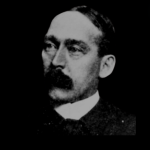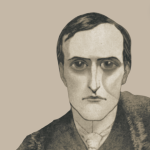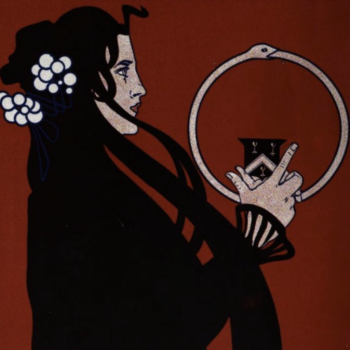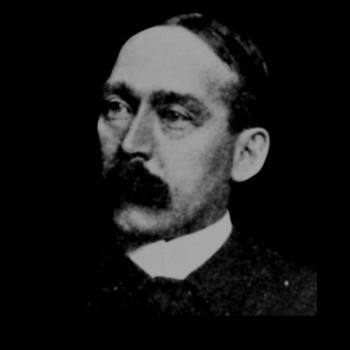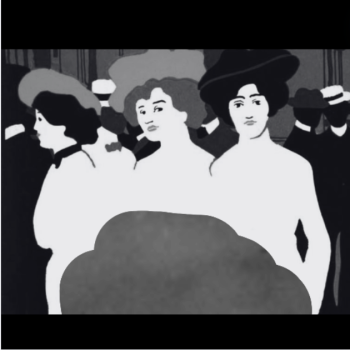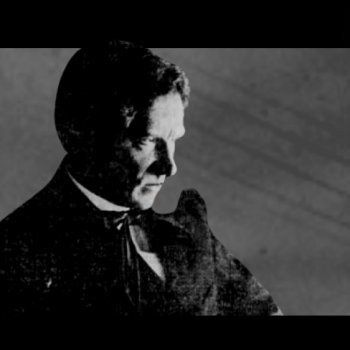PROGRESSIVE WOMAN SUFFRAGE UNION
“If you want to have your own way,” said Alma, “marry a widower older than you.” Alma Webster Powell, an opera singer, noted in musical circles, had just finished a performance for the Progressive Woman Suffrage Union in the Van Dyck studios. The smiling, white-haired pianist, who provided her piano accompaniment, seemed to confirm Alma’s claim. Alma met her husband, Adoniram Powell, at a church recital of which he was the organist.[1]

Alma Webster Powell. (wiki)
There were as many “brands” of suffrage at the meeting, as there were varieties of cake in the studio, filled with Gobelin blue tapestries, oriental rugs, and casts of Venuses, Victories, and Cupids occupying every available niche. The Woman Suffrage being represented by Rose Schneiderman of the Cap Maker’s Union, Alexander Irvine and Lilly Devereux Blake, a suffragist from an earlier age; her manner of thought was now seen as “gently old-fashioned,” by “the militant, modern movement” like the visiting British suffragist, B. Borrman Wells, who made headlines two days earlier for her action on Wall Street.
“I never took much interest in the movement,” said Alma, “till I read of the way Mrs. Wells and the other suffragettes were treated in Wall Street the other day.” Wells arrived on Wall Street in carriage with other campaigners, hoping to convince Wall Street financiers to use their influence to effectuate legislation in Albany. It was a disaster. The men of Wall Street rained down apple cores, wet sponges, ticker tape, and other garbage—including their insults.[2] All over Europe I have boasted of the chivalry of American men,” Alma continued, “I can never do that again. I will think always of the men who hooted and jeered good women who came to talk to them of a cause in which they are sincerely interested. Believe in the street meetings. The great French Revolution was accomplished by them. The great Russian Revolution, yet to be, will owe its triumph to them. Persecution was all the woman suffragists needed. Once a cause is persecuted it is as good as won. Women, from coming in contact with their babies, and the neighbors, are better judges of human nature than men. They spank nature every day. They are good judges of character, and character is what a candidate should have.” The soprano, wearing a black velvet sheath, had undeniable presence.

Rose Schneiderman. (Source: Jewish Women’s Archive.)
The next speaker, Rose Schneiderman, wearing a plain skirt and shirtwaist, was a testament that no two women, or suffragists, were exactly alike. Her face almost mirroring the portrait of the “Mona Lisa” hiding in the dim, shadowy, corner of the parlor.
“You shouldn’t mind,” Rose said, “because the financiers acted like loafers last Thursday. That is just what you should expect of them. What are they, anyway, but loafers, whose sole occupation is trying to take away other men’s wealth? Let me assure you that the workingman is with you and will help you all he can…I notice when we go on strike,” Rose said, “the policeman feels no more sentiment about clubbing us than if we were men.
“I don’t take much stock in the ‘home argument’ of those who were mean enough to try to keep woman from getting her rights,” said Rose. “The working woman didn’t have any home—she frequently has no more than a hole, and if giving her the ballot would deprive her of that miserable apology for a home and give her a chance to begin all over again I think it would be an excellent thing.” Rose then explained her definition of a good woman. “She is not the woman who stays at home and tends to babies and knows nothing of what is going on outside. I call that merely a passive woman. A good woman is one who works as a part of the whole and tries to make the whole better.”
“If woman wanted the right to vote,” said Irvine, “she ought to have it, and all this discussion as to whether the enfranchisement of the ‘weaker sex’ will further the cause of temperance, or do away with child labor, or increase wages, or accomplish or abolish a hundred other things, is tommyrot!
“I am a Socialist,” Irvine proclaimed in fervid tones, “and I would be ashamed if I wasn’t an ardent suffragist. You must not forget that the Socialist party is the only one that has come out boldly in your favor, and it would be well for the Republican and Democratic parties to remember it too.” Irvine’s wild-eyes tightened their focus on the assemblage. “I broke a lance against some book I had read,” Irvine said, “where and old ‘Johnny’ was honored by the Prince because he had thirty children. This seemed to me too much like the apotheosis of a jack-rabbit.” Everyone gasped. The room went silent. Everyone experienced an acute feeling of discomfort at Irvine controversial analogy.[3] Irvine did not to care, and staring at the old brass candlesticks resting on the piano, his could not help but think of that famous scene in Les Miserable. “It is the daughters of the poor, that become the victims of middle-class lust,” Irvine thought, “Fantine is the daughter of a working man.” He, too, thought about these “men” of Wall Street. “How pure in the sight of God is poor Fantine, when compared with the cowards who will not smash the mill of which she is the mere grist?” There was no question that women should vote.[4]
PEOPLE OF THE UNDERWORLD
I. INTERCOLLEGIATE SOCIALIST SOCIETY.
II. THE CRY OF PEONAGE.
III. MUCKERS.
IV. GALLAGHER’S HELL.
V. PUNK.
VI. SOUDAN.
VII. BOWERY.
VIII. “IT IS A BETTER FLAG THAN THE AMERICAN FLAG.”
IX. PENETRATING THE ASCENSION.
X. “THE UNIVERSE IS BASED ON THE SUBJECTION OF WOMAN.”
XI. PROGRESSIVE WOMAN SUFFRAGE UNION.
XII. THE CHRISTIAN SOCIALIST FELLOWSHIP.
XIII. THE ERUPTION OF THE END.
SOURCES
[1] Derby, George; White, James Terry. The National Cyclopædia Of American Biography. James T. White & Company. New York, New York. (1910): 329.
[2] “Invaded By Suffragettes.” The Yonkers Statesman. (Yonkers, New York) February 28, 1908; “Routed At Wall Street.” The New York Tribune (New York, New York) February 28, 1908.
[3] “‘Wall Street’s Jeers Have Made Me A Convert To Woman Suffrage,’ Says Mrs. Alma Webster Powell.” The Evening World. (New York, New York) March 2, 1908; “The Suffragettes At Tea.” The Sun. (New York, New York) March 2, 1908.
[4] Irvine, Alexander.” From the Bottom Up: The Life Story of Alexander Irvine. Gosset & Dunlop. New York, New York (1910): 287.


